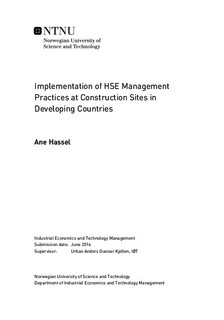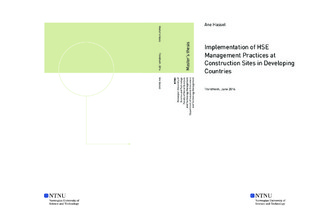| dc.description.abstract | The objective of this master s thesis was to investigate and evaluate HSE management practices implemented by Statkraft in a construction project in a developing country where the frame conditions are different from the Western countries where they have been developed.
To evaluate the HSE methods, a case study approach was utilized by using one of Statkraft s construction projects, the Moglice Hydropower Project, in Albania as a case.
The HSE methods assessed were 1) management of safety in work with severe accident potential, 2) management of HSE compliance by the Client s site team through inspections of Contractor s work
and 3) initiatives to ensure employee HSE engagement. For the management of safety in hazardous work, road transportation, tunnelling and lifting operations were selected as hazardous work cases. Of the initiatives to ensure employee HSE engagement, JSAs, RUOs and toolbox talks were addressed.
The HSE methods have been evaluated by following the principles of evaluation research. In the evaluation, the level of implementation, immediate effect, intermediate effect and long-term effect was assessed whenever possible. To evaluate the level of implementation, the Client s requirements in the contractual documents and in the Contractor' and the Project s own procedures served as evaluation criteria.
The mini- audit carried out of Contractor s management of safety in hazardous work showed that some of the requirements have not been implemented in the project. From behavioural sampling performed on the hazardous work cases, it was discovered that safety rules were not always complied with and that the supervision and enforcement schemes were considered insufficient. The evaluation of the Client s site team s approach for carrying out safety inspections showed that the Client s site team has failed in terms of implementing the Client s requirements in their written safety management system and in the project. Due to a low level of implementation of medial actions, it is concluded that the immediate effect of the safety inspections is low. From the evaluation of Contractor s initiatives to ensure employee HSE engagement, it became apparent that there is a solely top- down communication between managers and workers and that engagement of workers in HSE issues in the project is almost non- existing.
The gaps identified in the evaluation were discussed in light of external and internal factors influencing the implementation of the safety management system. It became apparent that internal factors had a larger influence on the gaps identified than external factors and that the level of implementation and the quality of the execution to a large extent were depending on individuals. Of the internal influencing factors, management support, personal motivation, appropriate supervision, enforcement scheme, personal competence and program evaluation stood out. Of the external factors, national culture seemed to have an influence on the workers participation in HSE matters. Albania s economic situation also seemed to influence the quality of both the Client s and Contractor s safety inspections, as there is a lack of experienced and qualified HSE personnel in the country.
A further analysis of how external and internal factors influenced the HSE methods showed that external factors in developing countries such as national regulations and authority handling, national culture and national economic wealth, often seem to make the internal factors such as management commitment and safety prevention and control systems more prominent. When implementing safety management practices at construction sites in developing countries, the establishment of training programs and strict supervision is even more important as the workforce often consists of unskilled workers. As developing countries are often characterized by high power distance and masculinity, lifesaving safe rules and incentives for RUOs and safe behaviour should be established. | |

